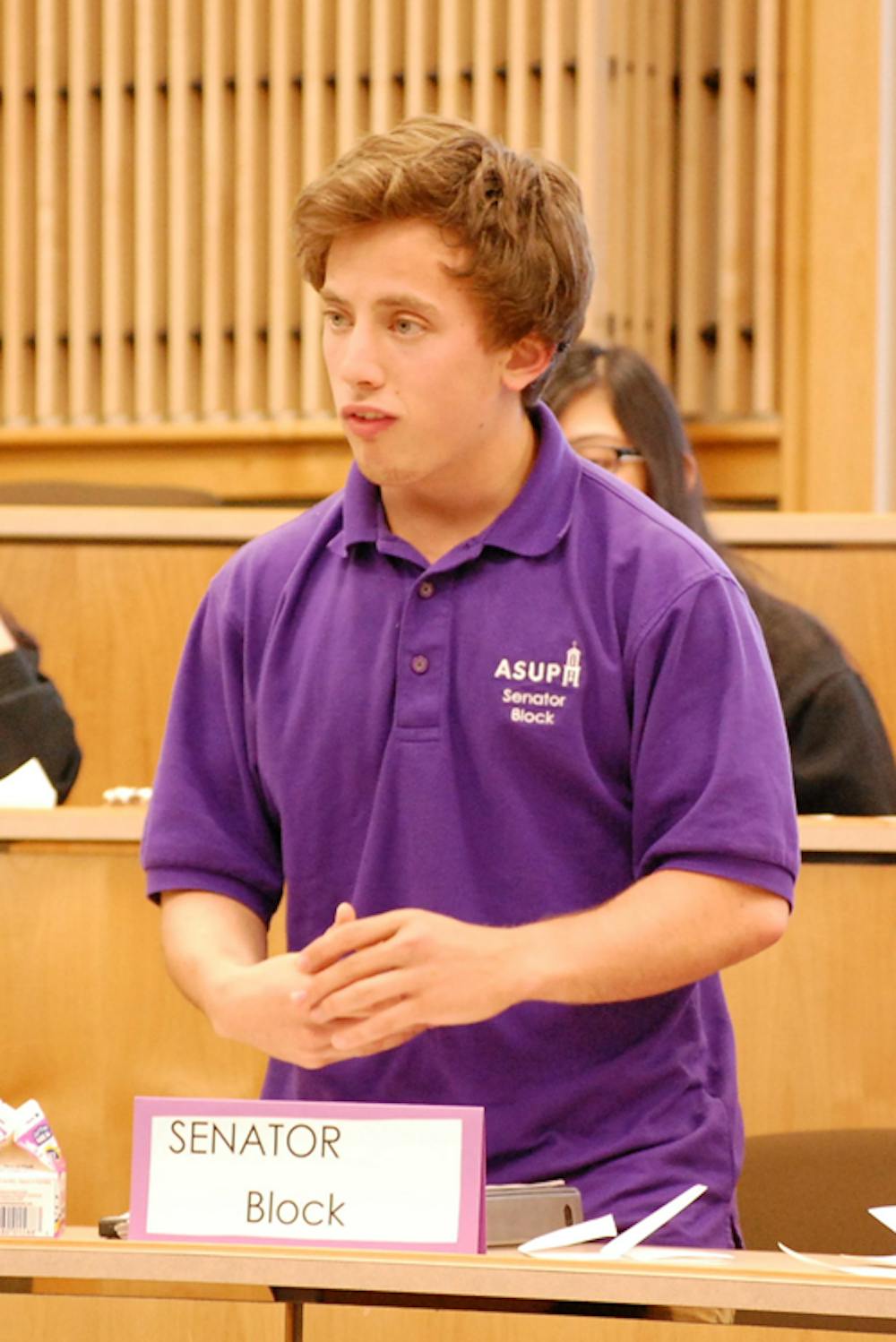The Senate proposes two resolutions to address the Nondiscrimination Policy and issue of exclusion
Senator Derek Block proposes Reso- lution 13-10. The resolution asks for an Office of Inclusion. (Stephanie Matusiefsky | THE BEACON)
By Kathryn Walters, Staff Writer walters14@up.edu
After years of staying quiet on the issue of discrimination, in the last two weeks ASUP Senate has proposed two resolutions to address inclusion and the Nondiscrimination Policy at UP.
Resolution 13-06 recommends adding sexual orientation and gender identity to the Nondiscrimination Policy, while Resolution 13-10 would create an Office of Inclusion, where a group of trained faculty and staff would be a resource for minority students who feel discriminated against or excluded. Both resolutions are dependent on a passing vote in ASUP and the approval of the administration.
ASUP President Brock Vasconcellos said the Senate's willingness to tackle these issues is exceptional.
"I think that it speaks a lot to the way students have started to perceive ASUP," he said. "There's a new level of legitimacy with it that the Senate and ASUP is an effective tool to bring about change."
These resolutions are a development in the ongoing discussion about UP's Nondiscrimination Policy, which does not include sexual orientation or gender identity. After University President Fr. Bill Beauchamp's remarks at the annual Fireside Chat Feb. 18 about faculty in same sex relationships on campus, a student-run campaign, Redefine Purple Pride, emerged.
Redefine Purple Pride set up an online petition and demonstrated around campus on Feb. 28 to compel the administration to change the Nondiscrimination Policy to include sexual orientation and gender identity. As of Tuesday, the petition had over 1,700 signatures.
Some faculty members have also taken a stand for nondiscrimination. According to philosophy professor Andrew Eshleman, a letter was sent to the Ad Hoc Presidential Advisory Committee on Inclusion recommending that sexual orientation be added to the Nondiscrimination Policy. As of Tuesday, the letter had 55 signatures, mostly from senior faculty.
Revising the policy
Senator Elvia Gaona said she was inspired to write Resolution 13-06 after reading about students' concerns about the Nondiscrimination Policy in a report.
"One of the main things I remember it saying was that ASUP is pretending that this isn't happening and it's ignoring it, which we were," she said. "And I think a lot of people in the Senate may have had difficulty bringing it out to Senate."
The resolution asks the administration to "add sexual orientation and gender identity in the nondiscrimination policy of the University of Portland for students, faculty and staff."
Before voting on the resolution, the Senate wants to know the legal ramifications of changing the Nondiscrimination Policy. At Monday's ASUP meeting, Vice President Kyle Hamm proposed an extra Senate meeting in the near future to hear from one of the administration's legal experts, like Fr. Gerry Olinger, vice president for Student Affairs, or Danielle Hermanny, executive assistant to the president, about what a change to the Nondiscrimination Policy would mean.
Gay Straight Partnership President Kirsten Rivera applauds the Senate's decision to wait on a vote until it hears all sides of the argument.
"It's a really smart decision to wait until they understand the legality of what they're asking for, because if they have it all figured out, and they present it to the administration, then the administration has no other work that they need to put into it," she said.
Unlike a typical resolution, if the Senate eventually passes Resolution 13-06, Gaona said Beauchamp would have to consult the University's Board of Regents if he wants to approve it because the Board has control over University statutes.
Redefine Purple Pride leader Shanay Healy, a senior, is optimistic about the Senate's motivation to confront the administration concerning the Nondiscrimination Policy.
"What they have, what we don't, is a direct connection to the administration and an authority to represent all of the students," she said. "By them saying, 'We as ASUP want this to happen and we feel that this would be best for all students,' that's huge."
Office of Inclusion proposed
Senator Derek Block presented Resolution 13-10 at Monday's ASUP Senate meeting, which proposes the creation of an Office of Inclusion. This office would be made up of a group of faculty and staff trained to handle diversity issues, address concerns and be a resource for minority students, including LGBTQ students, who may feel unwelcome.
The resolution also calls for an orientation program that introduces incoming freshmen to the diversity of the University community to ease the transition to college and keep an open dialogue about inclusion and diversity.
"I think it's great that we want to put in extra words to our statement of inclusion, but I feel like it would be something useful to have something that's a physical entity on campus," Block, a sophomore, said at the meeting.
Although this group would not necessarily have to be a physical office in a building, senators recognize the importance of having a unified institution on campus that addresses the needs of minority students.
"I think it's important that we unite all these groups on campus," senator Corey Trujillo said at the meeting. "If we had some centralized umbrella organization that could advertise all of them, that would definitely help."
Healy is supportive of Resolution 13-10, but remains adamant that the Nondiscrimination Policy must be changed.
"I don't think we can have one without the other," she said. "I think the Office could be huge in terms of changing the culture on campus and to make people's experiences different. Together it would be awesome, but my first priority is for the Nondiscrimination Policy to change."
Once both resolutions are thoroughly discussed, and after ASUP hears from a legal expert, a vote will be likely in the next few weeks.








